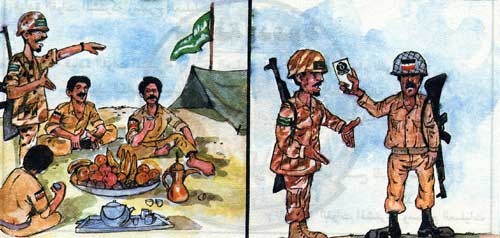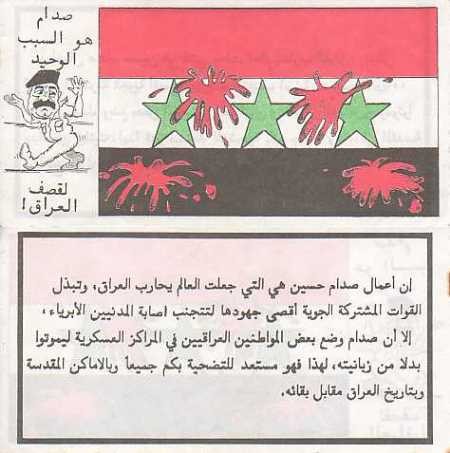Copyright © 2004 ِAli Darwish. All Rights Reserved.Published concurrently in al-Manac (abridged)
How Arabic Translators Frustrated America's War on Global Terrorism!Ali Darwish Click here for the full Arabic version No sooner had the US President George W. Bush uttered the inauspicious word, “crusade”, in his declaration of war against what he termed “global terrorism”, following the September 11 attacks on the World Trade Center and the Pentagon in 2001, than the whole Arab and Muslim world went up in arms, sometimes literally, accusing the US president of waging a new Crusade against Islam. In a damage-control exercise, White House press secretary Ari Fleischer soon afterwards told reporters that President Bush only meant to say that this is a "broad cause" to stamp out terrorism worldwide. "I think to the degree that that word has many connotations that would upset many of our partners or anybody else in the world, the president would regret if anything like that was conveyed. But the purpose of his conveying it is in the traditional English sense of the word, it's a broad cause," said Fleischer. [source: Newsday, Inc.] It is not surprising though in a region that has grown suspicious and weary of a consistently lopsided US foreign policy towards the Arabs and the Middle East, where the belief in conspiracy theory prevails, sometimes for good reasons, that Bush's supposedly sloppy remark has been interpreted rather as a Freudian slip. Undoubtedly, regardless of whether Mr Bush was shooting from the hip or was prepped up by his advisers, the responsibility for this improvisation lies squarely with the president's policymakers and advisers, particularly, the so-called psyopers (Psychological Operations specialists). When it comes to understanding other peoples’ cultures and values, these experts have consistently exhibited a lack of sensitivity and understanding. For instance, during the war against the Taliban regime in Afghanistan, the US Department of Defense offended America’s Afghan and other Muslim allies by designating its military campaign as Operation Infinite Justice. Muslim clerics and groups were quick off the mark to protest this codename because Islam teaches that only God provides "infinite justice". In an attempt to recover from this temporary lapse of good judgement, the name was quickly changed to operation Enduring Freedom. Not only have these experts overlooked vital cultural differences, they have also shown poor understanding of the translation process and more so the absolutist literal translation approach adopted by many ill-trained, under-skilled Arabic translators. Research has shown that when the level of uncertainty is high, the translator tends to adhere to the surface plane of text. "The more uncertainty there is about the information in a text, the closer the translator’s adherence to the formal component of text" (Darwish, 1998). During the Liberation of Kuwait campaign in 1991, the US army allegedly dropped twenty-nine million surrender leaflets over Iraq. An elaborate iterative process is reported to have been used to design these leaflets to “seize as many hearts and minds as possible without a fight”. According to Brockmann and Sinatra (1995), “Were it not for the use of the iterative process in designing, pretesting, and redesigning the prototypes into culturally relevant appeals, far fewer than nearly 87,000 enemy surrenders would likely have resulted”. The leaflets had to convey the right message to the Iraqi troops on the ground. Unfortunately however, despite the psyopers’ acclaimed rigorous process little did the authors of the surrender leaflets know that their work was basically wasted in the translation into Arabic. With their apparent mono-cultural literacy, monolingual perspective and gung-ho approach, these psyopers seem to have simply overlooked a crucial stage in cross-cultural information development, namely translation—which is as, if not more complex and intricate than the process of developing the original text itself. In all likelihood and judging by the Arabic translation of these surrender leaflets and subsequent war propaganda materials, the task of translation must have been given to under-skilled translators. Instead of submitting the leaflets to the rigors of a proper iterative translation process of re-purposing the monolingual texts, these unqualified translators managed to produce an Arabic version of the leaflets that was just a carbon copy of the original, with the illocutionary force and rhetorical impact of the English text lost in the translation. While such lack of understanding of not only the audience of the leaflets but also the intricate nature of translation is not surprising in a mediocre world that has not yet recognized translation as a fully-fledged profession, and where translators are largely regarded as minions of superior professions and translation agencies, and are still being remunerated on per word basis (or "kilos of pages") rather than on time, effort and more importantly expertise, it has dramatically contributed to the compounded distortion of the US message to the Iraqi people and beyond.
A close analysis of the Arabic texts of these leaflets suggests that despite these experts’ efforts to produce leaflets that were effective and localized, the translation product was far from being appropriate in terms of its original message and associated images. Taken by itself, the translation would not have been effective to entice the Iraqi soldiers to surrender. The text is rather comical and sounds more like an invitation to a party than a call to surrender. Moreover, the soldiers depicted in these leaflets were stereotypical of the Arabs. Without the country-specific markers, one could readily distinguish between the Iraq soldier with his thick Saddam-style mustache and pot-belly, the Kuwaiti soldier with his skinny build, pointy goatee and thin mustache, and the Saudi soldier with his gaping mouth, dropped jaw and “Rolex” wristwatch. These leaflets clearly show how self-centered, indoctrinated specialists can get carried away with the notion of cultural differences and stereotypes and misconceptions that defeat the purpose they set out to achieve. Perhaps more realistically, the incessant, relentless and sustained bombing of hungry, weary and ill-trained soldiers huddled in their WWI foxholes was more convincing than inappropriate caricature surrender leaflets. In later campaigns, the concept of reusability and recycling was put to practice. Off the shelf, ready-made leaflets from the Vietnam and Korea wars seem to have been used with ineffectual Arabic translation add-ons. Arguably, these were equally ineffective and inappropriate.
Ironically, a surrender leaflet dropped on Iraq in 2003 depicted the Iraqi flag with blood spots blotting the phrase God Almighty, while the accompanying text read: "Saddam is willing to sacrifice you all, the holy sites, and the history of Iraq in order to stay in power”. Is this a message aimed at “winning the hearts and minds of the Iraqi people”? The problem of the Iraqi people is certainly not with their faith, as the recent developments on the ground have clearly demonstrated. It is supposed to be with Saddam and his regime. By blocking the phrase “God Almighty” in the Iraqi flag, the leaflet designers inadvertently offended the entire Iraqi people. In a devious maneuver to outbid the Islamic Republic of Iran, Saddam added the phrase “God Almighty” to the Iraqi flag in the dying days of the Iraq-Iran war. Any future Iraqi government will find it extremely difficult to change the flag or drop the phrase “God Almighty”.
When the US administration announced its plans for the Greater Middle East, the label was translated willy-nilly into Arabic as “The Great Middle East” or “The Grand Middle East”. This translation, which is as controversial and fuzzy as the original label itself, has clearly forced the US administration to rename its initiative to “The Broader Middle East Project”, once again showing lack of understanding of the risks of producing text destined for translation yet not designed with translation-driven cross-cultural communication in mind. When a commissioned translator asks how to translate a phrase as simple as “Halt! US forces!” into Arabic, or any other language for that matter, one is bound to question the competence and aptitude of such a translator and the wisdom of those commissioning the translation. Is it surprising then, in such a mediocre world, that the US message has been compromised? US administration experts boast to know the so-called Arab mind, which is not "western-organized", as a former US diplomat cocksurely told Tim Sebastian of Hardtalk in a recent BBC interview, perpetuating the Hollywood stereotype of the Arabs as a subspecies of some sort. In this case, they should have known better, especially when they are trying to export their brand of freedom and democracy to a region long held under the thumb of mainly US-backed, despotic regimes and lackeys. Ill-advised experts and ill-trained translators seem to have played a major role in distorting America’s message to the region. ReferencesBrockmann, R. J. and Sinatra, S. (1995). How the Iterative Process Helped the Allies Win the Persian Gulf War. STC Intercom, Vol. 42, No 9, November, 1995. Darwish, A. (1998). Translation as A Decision Making Process under Constraints - A Think Aloud Study. PhD thesis. Fireman, K. (2001). Rumsfeld Says U.S. to Target Nations that Aid Terrorists. Newsday, Inc.; 19 September 2001. http://www.nynewsday.com/ny-uspent192372565sep19,0,4388244.story. Picture sources:
http://popularmechanics.com/science/military/2003/3/qatar_report_2/print.phtml.
Copyright © 2004 Ali Darwish.
Please direct all comments on this page to Ali Darwish. |


